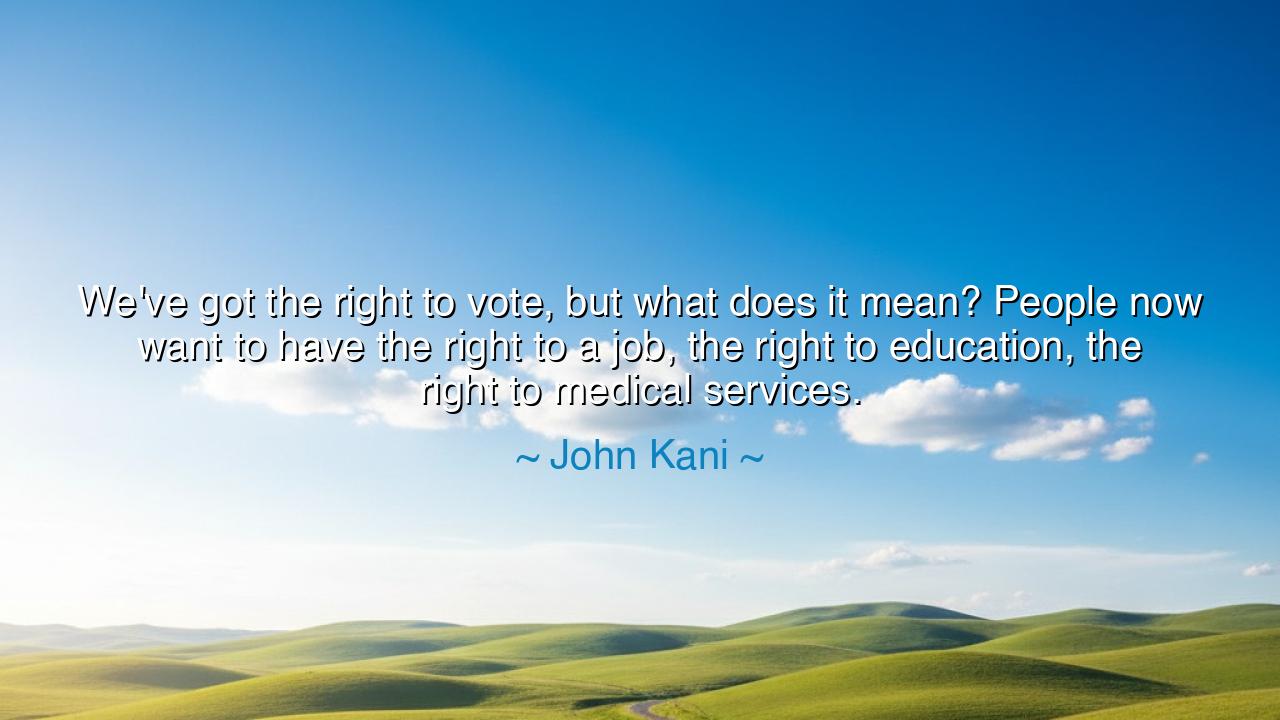
We've got the right to vote, but what does it mean? People now
We've got the right to vote, but what does it mean? People now want to have the right to a job, the right to education, the right to medical services.






“We’ve got the right to vote, but what does it mean? People now want to have the right to a job, the right to education, the right to medical services.”
Thus spoke John Kani, the South African actor, playwright, and freedom voice, whose life was carved from the same struggle that gave birth to his nation’s democracy. In these words, he poses a question not of cynicism, but of awakening—a challenge to all who believe that freedom ends at the ballot box. His words resound like the echo of an ancient drum: political freedom without social justice is an unfinished revolution. For what is the right to vote, if the stomach is empty? What is democracy, if the people cannot live in dignity?
To understand the depth of Kani’s words, we must see their origin in the long shadow of apartheid, that dark era when South Africa’s people were divided by law and by cruelty. For generations, the oppressed fought not only for the right to be heard, but for the right to be seen as human. When victory came, when the chains of apartheid were broken and the people could finally cast their votes, it was a sacred moment—a sunrise after centuries of night. Yet as Kani reminds us, dawn is not the day. Voting opened the gates of freedom, but freedom itself still had to be built.
In his quote, Kani exposes the second struggle—the struggle after liberation. The people, once denied their voices, now demanded the substance of life: work, learning, and health. These, he declares, are the true pillars of equality. For the right to vote means little if one votes from a place of poverty; it is hollow if one’s children are hungry or uneducated, if sickness goes untreated, if opportunity remains a stranger. The ancient philosophers would have understood him well, for even Aristotle wrote that a society cannot be just if its citizens live without the means to fulfill their purpose.
This truth is not South Africa’s alone. Across history, every revolution faces the same test. When the French overthrew their monarchy, they cried for “Liberty, Equality, Fraternity.” Yet when liberty came without bread, the streets burned again. When America declared independence, it promised life, liberty, and the pursuit of happiness—but centuries later, the fight for civil rights revealed that political freedom without social equality was but half a dream. Kani’s question—what does it mean?—is thus the question of every generation that inherits democracy and must give it meaning through justice.
His invocation of the right to a job, to education, to medical services is not a plea for charity, but for human wholeness. He speaks from the wisdom of the elders who knew that freedom must touch both the spirit and the flesh. A starving man cannot celebrate democracy; an ill child cannot recite the national anthem. True liberty, Kani reminds us, must live in the body as well as the soul—in the classroom, in the clinic, in the dignity of work. It must be felt, not just proclaimed.
There is a quiet heroism in Kani’s vision. He does not curse the achievement of voting rights—he honors it—but he refuses to let it become complacency. His voice is that of the watchman on the city wall, calling out to the builders: “Do not rest! The foundation is laid, but the house is not yet finished.” His words are both gratitude and demand—gratitude for the path that has been walked, and demand for the courage to keep walking.
From his reflection, let all people draw this timeless lesson: freedom is not a single act, but a continual labor. The right to vote is the seed, but it must be watered with justice, nourished with opportunity, and protected with compassion. To stop at the ballot is to abandon the garden half-grown. Each generation must tend it anew, ensuring that no one’s freedom is mere theory, and that the promise of equality becomes the practice of everyday life.
And so, let us remember John Kani’s challenge: political liberty without social dignity is a shadow of true freedom. The work of democracy does not end in celebration—it begins there. To honor the right to vote, we must build the world that right was meant to create: a world where every child learns, every worker labors with purpose, and every life, rich or poor, is guarded by care. Only then can we say that freedom has truly arrived—not as a word, but as a way of life.






AAdministratorAdministrator
Welcome, honored guests. Please leave a comment, we will respond soon